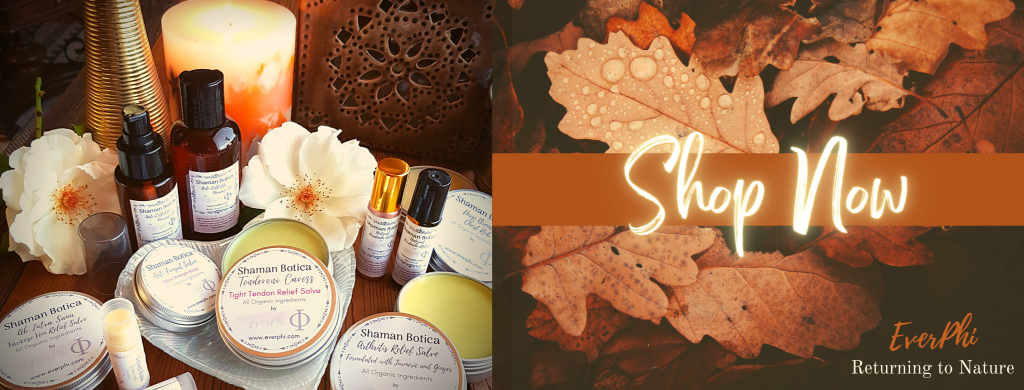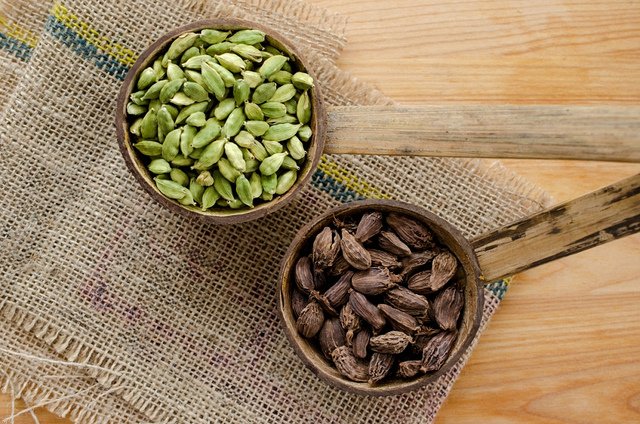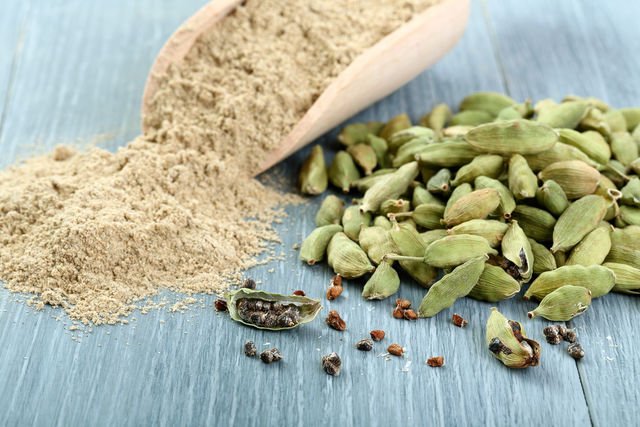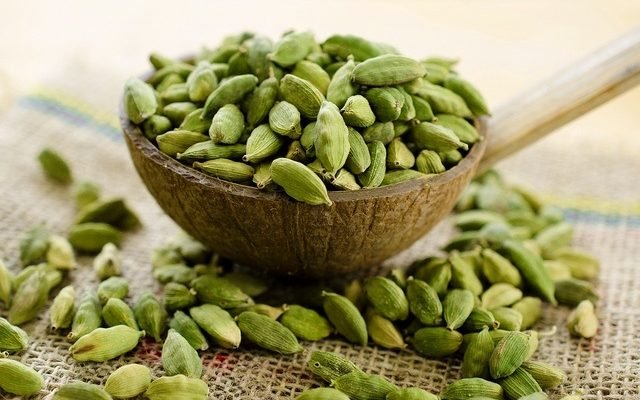
Cardamom essential oil is a substance extracted from cardamom seeds that have previously been dried.
It has a pale yellow color and a deep-warmy, spicy, sweet, slightly lemony and balsamic-woody aroma.
These seeds are obtained from the species Elettaria Cardamomum, belonging to the family of Zingiberaceae (ginger family).
Cardamom is derived from two types within the Zingiberaceae family. It is a perennial herbaceous plant that grows spontaneously in tropical areas, and can reach 2-3 meters in height.
It has long lanceolate and sessile leaves. Its flowers are yellow and its fruits are reddish seeds.
The cardamom seed is the third most economically valuable species worldwide, after saffron and vanilla. It is an indispensable component of curry, and is popularly known as the “queen of spices”.
In addition, it has become a spice with great demand, especially in recent years. Its fame is due to its growing use as a condiment for rice, breads, desserts, curries, or as a flavoring of coffee, tea and gin.
India has been the largest producer and exporter of cardamom seeds since ancient times, but today it has been overtaken by Guatemala.
Cardamom oil combines well with essential oil of rose, frankincense, lemon, myrtle, pine, geranium, juniper, coriander, galbanum, cistus, orange, bergamot, cinnamon, ylang ylang, clove, caraway, verbena, neroli, balsam fir and cedarwood.
Cardamom is native to the monsoon forests of the Western Ghats in southern India, a mountainous area of the Malabar coast. This area is known as “The Cardamom Hills”.
It is where it has traditionally been used as a condiment, medicine and in religious ceremonies.
When India was conquered and colonized by the English in the 19th century, they established plantations, making India the world’s leading producer of cardamom.
Later, in 1914, its cultivation was introduced in Guatemala, becoming in 1980 the first producer and exporter in the world.

In the fourth century BC, the papyrus of Ebers, an Ayurvedic document of Sushruta Samhita, (an ancient Sanskrit text on medicine and surgery) is the one that shows for the first time, information about cardamom.
This is mentioned as an ingredient in different preparations, and also as an offering during ceremonies.
The Greeks imported it along with other spices from the East, and called it kardamomon. Both, they and the Romans, use this spice in perfumes, ointments and aromatic oils. However, the Arabs were the main merchants of Indian spices, among them, cardamom.
In 1550 BC approximately, cardamom was discovered in Egypt. In the East, it was considered an aphrodisiac plant, and much later, in the Middle Ages, almost unlimited medicinal effects were attributed to it.
Additionally, it is said, after its discovery by the Portuguese, that the essence was distilled for the first time around the year 1544.
At present, the Arabs use it to aromatize the “bedouin coffee”, a symbol of hospitality in Saudi Arabia.
Besides, cardamom is one of the favorite spices of the Scandinavians, who add them to meats and sausages. It also has great importance in the production of candies, liquors and in perfumery.
The essential oil of cardamom consists of monoterpenes and sesquiterpenes:
Oxygenated compounds contribute to the odor of the essential oil.
The 1,8 cineol (eucalyptol) and α-terpene acetate are the two major constituents of the essential oil, and are responsible for the typical flavor of the species.
The health benefits of cardamom essential oil can be attributed to its action as a: spasmolytic, chemopreventive, analgesic, anticephale, antineuralgic, appetizer, antianorexic, carminative, choleretic-colagogue, sialagogue, tonic, invigorating, antiseptic, antimicrobial, astringent, digestive, stomach, stimulant, aphrodisiac, diuretic, gastroprotective, eupeptic, expectorant and respiratory.
Due to its balsamic and sensual aroma, cardamom oil is used in the preparation of soaps, cosmetics, perfumes, creams and lotions.
Applied with aromatherapy, massage or just inhaling from the bottle you can enjoy its effect as an aphrodisiac, awakens sexual desires, stimulating body and mind.
Also, cardamom essential oil will help you:

Relieves digestive problems: Due to its slightly thermal, tonic and stomach characteristics, cardamom oil exerts a very beneficial action in the digestive system, where it helps in case of nausea, vomiting, slow digestion or digestion cuts produced by sudden changes in temperature.
Besides, it promotes the production of saliva and the elaboration of bile, improving digestion and stimulating appetite.
To achieve relief, you should only dilute cardamom oil in a carrier oil and gently massage the belly.
Stimulates and increases mental alertness: It is an natural cephalic remedy and is indicated to awaken the mind, especially when it is numbed after a hearty meal, or after an excess alcoholic beverage.
Tones and promotes the proper functioning of our organism: Especially the central nervous system and the digestive system.
Natural Treatment for several diseases: Helps in the treatment of cardiovascular, circulatory, respiratory, digestive and genitourinary disorders, among others.
Calms common and specific pains: Such as headaches, migraines, myalgia, arthralgia, neuralgia, etc. Also, relieves cramps, muscle knots and spasms, while fighting inflammation.
Great ally for dental health: Eliminates bad breath, cures mouth infections and relieves toothaches.
Other Uses:
Cardamom essential oil stimulates our entire system. This stimulating effect also increases the mood in cases of depression or fatigue. It also promotes the secretion of various enzymes and hormones, gastric juices, peristaltic movement, circulation and excretion; thus maintaining an adequate metabolic action throughout the body.
Its diuretic effect promotes urination, which helps people lose weight, lower blood pressure, eliminate toxins and clean calcium and urea deposits from the kidneys.
Due to its eupeptic and carminative properties, cardamom oil increases the activity of trypsin, an enzyme that contributes to the digestive process.
Cardamom oil increases digestion by stimulating the entire digestive system. It is also stomachic in nature, which means it keeps the stomach healthy and functioning properly.
On the other hand, it helps to maintain the proper secretion of gastric juices, acids and bile in the stomach, and also protects it from ulcerations and possible infections.
By performing a gentle massage on the belly, diluting the cardamom oil in a carrier oil, we will stimulate its effect to favor a normal and pleasant digestion. Even after the heaviest and most difficult meals.
It is recommended in people with problems to digest heavy meals that consume cardamom seeds after eating. This is a traditional habit in Arab countries, where a few cardamom seeds are served along with desserts or coffee.
The essential oil of cardamom, tones our nervous system promoting its functionality, from our brain to our senses. It is specially recommended for treating stress, nervous exhaustion, depression, and anxiety.
Cardamom oil is one of the richest sources of 1,8 – Cineole that nature offers us.
The cineole or eucalyptol is a potent natural antiseptic that eliminates the bacteria that produce bad breath and cavities.. The ancient Egyptians used the seeds to maintain good oral hygiene and fight bacteria that damage the enamel, a custom that is maintained in Arab countries.
Cardamom oil has an exciting effect that can help cure sexual weakness, erectile dysfunction, impotence, loss of libido and frigidity.
Due to its compound 1,8 – Cineole, cardamom oil has a bactericidal and bacteriostatic action on microorganisms that cause respiratory infections.
On the other hand, its direct expectorant action is due to the pulmonary elimination of the essential oil. This causes the stimulation of nerve endings that innervate the mucous glands, producing an excess of tracheobronchial secretion, which is rich in water that will promote expectoration, that is, the elimination of excess secretion.
This effect also helps relieve tonsillitis, asthma, pharyngitis and bronchitis, among others.
Cardamom oil has a heating effect. This means that it warms the body and promotes sweating, while relieving common cold symptoms such as fever and the typical headache that results from the disease.
Also, it can be used to cure diarrhea caused by extreme cold.
Dyspepsia is a pain or an uncomfortable feeling in the upper middle part of the stomach. The pain might come and go, but it is usually there most of the time. People of any age can get dyspepsia. Both, men and women get it.
Often, dyspepsia is caused by a stomach ulcer or acid reflux disease. If you have acid reflux disease, stomach acid backs up into your esophagus (the tube leading from your mouth to your stomach) and eventually, this can cause chest pain.
However, it was shown that cardamom essential oil is effective in the 65% decrease in gastric ulcer. In addition, the total volume of gastric secretion, total acidity and thickness of the mucosal wall was not affected.
Cardamom oil is highly effective in curing muscle and respiratory spasms, therefore it relieves muscle twitches and cramps, asthma and whooping cough.
This oil contains powerful antiseptic and antimicrobial properties, which make it a good alternative to have in our emergency kit.
With it we can disinfect and clean wounds and use it as a mouthwash. By adding a couple of drops in a glass of water, we will disinfect the oral cavity from germs and also, we will eliminate bad breath.
Thanks to its orexigen and sialagogue properties, cardamom essential oil produces stimulation of salivary secretion and increased appetite, so it is indicated in people with lack of appetite, who need to gain weight or suffering from Sjören syndrome.
It acts as chemopreventive for its antioxidant properties and for the stimulation of the enzymes: glutathione-S-transferase, superoxide dismutase, glutathione peroxidase, and catalase.
The cellular hepatocellular carcinoma is one of the most common cancer and the most important cause of mortality in the world.
Studies showed the chemopreventive activity of cardamom essential oil, in hepatocellular carcinoma induced in rats.
This pathology causes an increase in the levels of ornithine decarboxylase, hepatic malondialdehyde, liver injury and markers; such as alanine transaminase, aspartate transaminase, alkaline phosphatase, and γ-glutamyl transferase.
Treatment with cardamom essential oil reduced liver injury, ornithine decarboxylase and malondialdehyde liver.
On the other hand, increased the formation of reduced glutathione and the activity of the antioxidant enzymes: catalase, superoxide dismutase, glutathione peroxidase, glutathione reductase and glutathione transferase.
